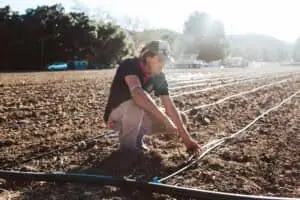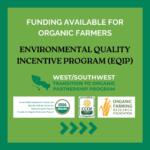Federal funding is available to help agricultural producers transition to an organic system of production. As part of the larger $300 million USDA Organic Transition Initiative, the Natural Resource Conservation Service has begun to make $70 million available to help producers adopt organic management systems in pursuit of certification. The following resources provide information on specific USDA technical assistance and funding support programs available to farmers. We will continue to update this with additional resources, so be sure to check back often.
Whole-Farm Revenue Protection (WFRP): Insurance Options for Organic and Transitioning Growers
New farmer-friendly resource breaks down how to access whole-farm insurance coverage.
 Organic and transitioning-to-organic producers face unique risks that aren’t always covered by traditional crop insurance. Fortunately, USDA’s Whole-Farm Revenue Protection (WFRP) program was designed with small-scale and diverse operations in mind, offering flexible, revenue-based coverage for farms of all sizes, including those growing specialty and organic crops. To help farmers better understand and access this program, OFRF has developed a new Whole-Farm Revenue Protection toolkit. LEARN MORE ABOUT WFRP TODAY.
Organic and transitioning-to-organic producers face unique risks that aren’t always covered by traditional crop insurance. Fortunately, USDA’s Whole-Farm Revenue Protection (WFRP) program was designed with small-scale and diverse operations in mind, offering flexible, revenue-based coverage for farms of all sizes, including those growing specialty and organic crops. To help farmers better understand and access this program, OFRF has developed a new Whole-Farm Revenue Protection toolkit. LEARN MORE ABOUT WFRP TODAY.
Lessons Learned from an NRCS Contract
One organic farmer’s journey through federal funding.
 We are spotlighting the experience of one organic farm—Three Feathers Farm in California—that received funding and support through the Natural Resource Conservation Service’s (NRCS) Environmental Quality Incentives Program (EQIP). Their story offers a transparent look at what it’s really like to work with NRCS: the benefits, the obstacles, and the lessons they’ve learned. We hope other farmers can use their experience to navigate the process of applying for and implementing EQIP contracts more easily. Read Héktor’s story.
We are spotlighting the experience of one organic farm—Three Feathers Farm in California—that received funding and support through the Natural Resource Conservation Service’s (NRCS) Environmental Quality Incentives Program (EQIP). Their story offers a transparent look at what it’s really like to work with NRCS: the benefits, the obstacles, and the lessons they’ve learned. We hope other farmers can use their experience to navigate the process of applying for and implementing EQIP contracts more easily. Read Héktor’s story.
Field Day Toolkit
A guide to organizing field days for agriculture research dissemination
 Field days provide a unique space for farmers, researchers, and agricultural professionals to come together to share insights, learn from one another, and foster future collaborations. Discover a roadmap and customizable materials to plan, host, and follow up on hosting a successful event at your farm or research site with OFRF’s new Field Day Toolkit. View the full Field Day toolkit here.
Field days provide a unique space for farmers, researchers, and agricultural professionals to come together to share insights, learn from one another, and foster future collaborations. Discover a roadmap and customizable materials to plan, host, and follow up on hosting a successful event at your farm or research site with OFRF’s new Field Day Toolkit. View the full Field Day toolkit here.
Utilizing NRCS Support on Organic Farms: Tech Note 12
Tech Note 12 provides a wealth of knowledge needed to effectively support the unique requirements of organic producers.
 The USDA’s Natural Resources Conservation Service (NRCS) offers funding and technical assistance to help farmers enhance their farming operations, including increasing support for transitioning to organic practices. However, farmers, field agents, and Technical Service Providers (TSPs) may not always be familiar with how NRCS programs can support organic practices. To address this, OFRF collaborated with NRCS to develop a document that equips farmers and field agents with the knowledge needed to effectively support the unique requirements of organic producers. That document is Technical Note 12 (TN-12). Learn more about Tech 12 today.
The USDA’s Natural Resources Conservation Service (NRCS) offers funding and technical assistance to help farmers enhance their farming operations, including increasing support for transitioning to organic practices. However, farmers, field agents, and Technical Service Providers (TSPs) may not always be familiar with how NRCS programs can support organic practices. To address this, OFRF collaborated with NRCS to develop a document that equips farmers and field agents with the knowledge needed to effectively support the unique requirements of organic producers. That document is Technical Note 12 (TN-12). Learn more about Tech 12 today.
The Organic Certification Cost Share Program (OCCSP)
Farmers across the U.S. may now receive up to $750 per scope for organic certification costs.
 As a farmer or a technical service provider to farms, you understand the importance of organic certification. It not only adds value to your products but also opens doors to a growing market of health-conscious consumers. However, the process of obtaining and maintaining organic certification can be costly. The good news is that financial assistance is available through the Organic Certification Cost Share Program (OCCSP) to help ease this burden. In this blog post, we’ll walk you through the basic steps to access up to $750 in financial assistance for each organic certification scope, covering expenses paid between October 1, 2022, and September 30, 2023. Find out how to get started here.
As a farmer or a technical service provider to farms, you understand the importance of organic certification. It not only adds value to your products but also opens doors to a growing market of health-conscious consumers. However, the process of obtaining and maintaining organic certification can be costly. The good news is that financial assistance is available through the Organic Certification Cost Share Program (OCCSP) to help ease this burden. In this blog post, we’ll walk you through the basic steps to access up to $750 in financial assistance for each organic certification scope, covering expenses paid between October 1, 2022, and September 30, 2023. Find out how to get started here.
Environmental Quality Incentives Program (EQIP)
Farmers across the U.S. are eligible for significant technical and financial assistance from the Natural Resource Conservation Service (NRCS).
 Farmers and technical service providers know firsthand that the most significant barriers to developing sustainable infrastructure and production practices are due to time and resource scarcity. NRCS’s EQIP program offers financial assistance and technical support to implement new conservation practices on your farm, with additional support for historically underserved applicants, including socially disadvantaged, beginning, veteran, and limited-resource farmers and ranchers. In this blog post, we’ll provide an overview of what EQIP has to offer and the steps to utilizing this program. Learn more.
Farmers and technical service providers know firsthand that the most significant barriers to developing sustainable infrastructure and production practices are due to time and resource scarcity. NRCS’s EQIP program offers financial assistance and technical support to implement new conservation practices on your farm, with additional support for historically underserved applicants, including socially disadvantaged, beginning, veteran, and limited-resource farmers and ranchers. In this blog post, we’ll provide an overview of what EQIP has to offer and the steps to utilizing this program. Learn more.
Organic Transition Initiative (OTI)
$75M in cost-share grant funding is available to certified organic and transitioning-to-organic growers under EQIP to meet NRCS’s Conservation Practice Standard for Organic Management (CPS-823).
 Organic farmers must manage their land without prohibited inputs for 3 years for their products to be certified. This transitioning period can be incredibly challenging as farmers and their land adjust to new production practices. OTI is intended to help producers implement conservation activities required for certification, receive expert technical support, and recover foregone income due to reduced yields during the transition period through EQIP. Read more today.
Organic farmers must manage their land without prohibited inputs for 3 years for their products to be certified. This transitioning period can be incredibly challenging as farmers and their land adjust to new production practices. OTI is intended to help producers implement conservation activities required for certification, receive expert technical support, and recover foregone income due to reduced yields during the transition period through EQIP. Read more today.


